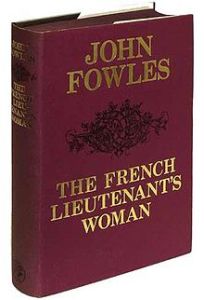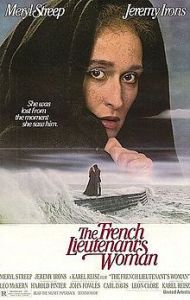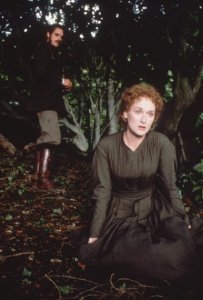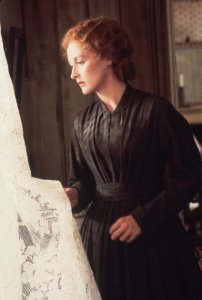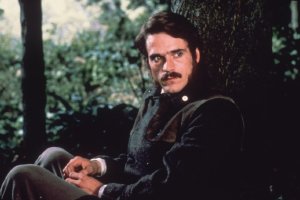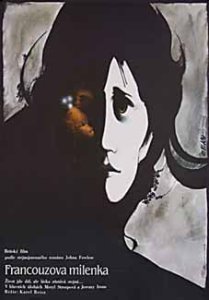The French Lieutenant’s Woman **** (1981, Meryl Streep, Jeremy Irons, Leo McKern) – Classic Movie Review 2.116
Director Karel Reisz’s fascinating 1981 film of John Fowles’s 1969 postmodern historical fiction novel The French Lieutenant’s Woman is graced with another literate, distinguished screenplay by Harold Pinter, striking cinematography by Freddie Francis, a lovely score by Carl Davis, and gorgeous period and contemporary production designs by Assheton Gorton.
The main role cries out for a British star like Helen Mirren, Julie Christie, Francesca Annis, Gemma Jones or Vanessa Redgrave (Mirren, Fowles’s choice, could well have been perfect) but, instead, Meryl Streep is cast for box-office clout. Streep seems slightly out of place doing another one of her famous accents as a former governess, but she is still very acceptable, giving an impeccable, polished performance as the complex and troubled Sarah Woodruff. And Jeremy Irons is stalwart as the Victorian gentleman palaeontologist Charles Smithson whose eye she catches.
In the story, set in 19th century England, Charles, visits his fiancé Ernestina (Lynsey Baxter) in the coastal town of Lyme Regis in West Dorset, but meets and enters into an intensely emotional relationship with enigmatic outcast Sarah, who leaves him after a short, passionate affair.
But screenwriter Pinter invents an effective parallel modern story as a film equivalent of the novel’s games with literary history, in which a film is being made of the story, and Streep and Irons play Anna and Mike, the actors playing the lovers in the movie. During the shooting of the film, Anna and Mike enjoy a relationship that runs parallel to Sarah and Charles’s. It sounds complicated but it’s really quite simple.
Reisz’s film is sometimes a bit stuffy and over-reverential but it is fascinating none the less. The screenplay, production, intricate period detail and atmosphere and the personable acting from a large ensemble cast smoothly carry the day. Also notable are Leo McKern as Dr Grogan, Patience Collier as Mrs Poulteney and Peter Vaughan as Mr Freeman.
Also in the cast are Hilton McRae, Emily Morgan, Charlotte Mitchell, Jean Faulds, Colin Jeavons, Liz Smith, John Barrett, Arabella Weir, Ben Forster, Catherine Willmer, Richard Griffiths, Graham Fletcher-Cook, Toni Palmer, Doreen Mantle, David Warner, Alun Armstrong, Penelope Wilton, Joanna Joseph and Judith Alderson.
It’s a film you expect to be showered with Oscars but there weren’t any. The film was nominated for five Academy Awards. Streep was nominated for Academy Award for Best Actress, and the film was nominated for Academy Award for Best Writing (Adapted Screenplay), but both lost to On Golden Pond. There was better news at the Baftas where it won Best Actress for Streep, the Anthony Asquith Award for Best Film Music for Carl Davis and Best Sound for Don Sharp, Ivan Sharrock, and Bill Rowe. Streep also won Best Actress at the Golden Globe Awards and it won Evening Standard British Film Award for Best Film.
The film was shot in 1980, on location in Lyme Regis in Exeter, London docks and Lake Windermere, with studio sets built at London’s Twickenham Studios to Gorton’s period-perfect designs. The harbour wall, known as The Cobb, also features in Jane Austen’s novel Persuasion.
In 1968 Fowles and his wife moved to Lyme Regis, where they lived much of the time in Belmont House, which Fowles uses as a setting for parts of The French Lieutenant’s Woman.
American-born conductor and composer Carl Davis CBE died from a brain haemorrhage in Oxford, on 3 August 2023, aged 86. He lived in the UK from 1961 and married the British actress Jean Boht on 28 December 1970.
Davis composed the scores for many films, including The Bofors Gun (1968), The Only Way (1970), I, Monster (1971), Up Pompeii (1971), Up the Chastity Belt (1971), Rentadick (1972), What Became of Jack and Jill? (1972), Catholics (1973), Man Friday (1975), The Sailor’s Return (1978), The French Lieutenant’s Woman (1981), Champions (1983), King David (1985), The Girl in a Swing (1988), Scandal (1989), The Rainbow (1989), Frankenstein Unbound (1990), The Trial (1993), Widows’ Peak (1994), The Great Gatsby (2000), Mothers & Daughters (2004) and The Understudy (2008).
He was commissioned to create music for Thames Television’s Hollywood: A Celebration of the American Silent Film (1980). The same year Davis’s music was used when Abel Gance’s epic silent film Napoléon (1927) was restored, followed by similar treatment for D W Griffith’s Intolerance (1916). Davis became the number one choice for new scores to silent films.
© Derek Winnert 2015 Classic Movie Review 2,116
Check out more reviews on http://derekwinnert.com/

